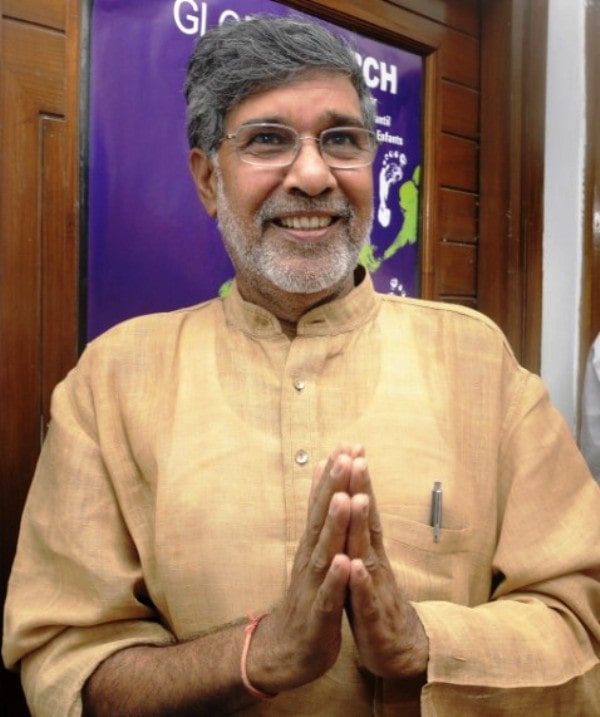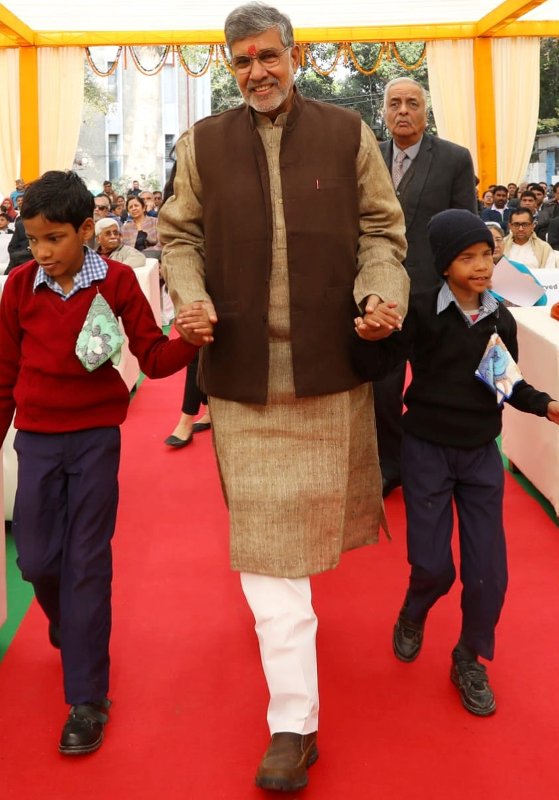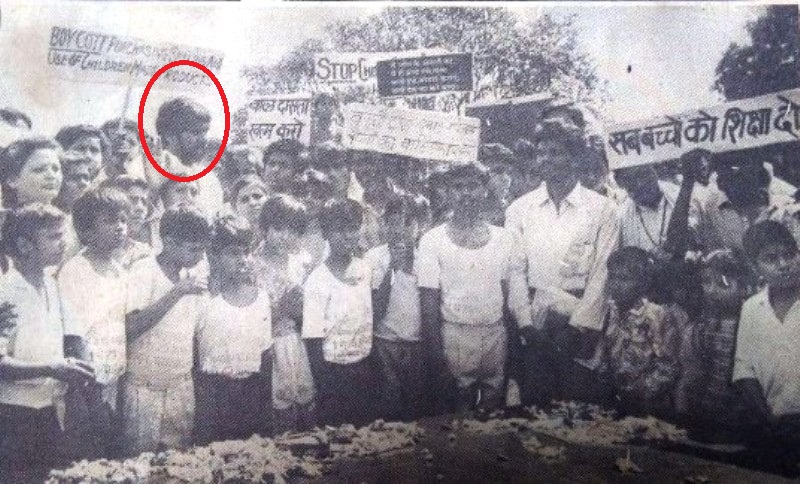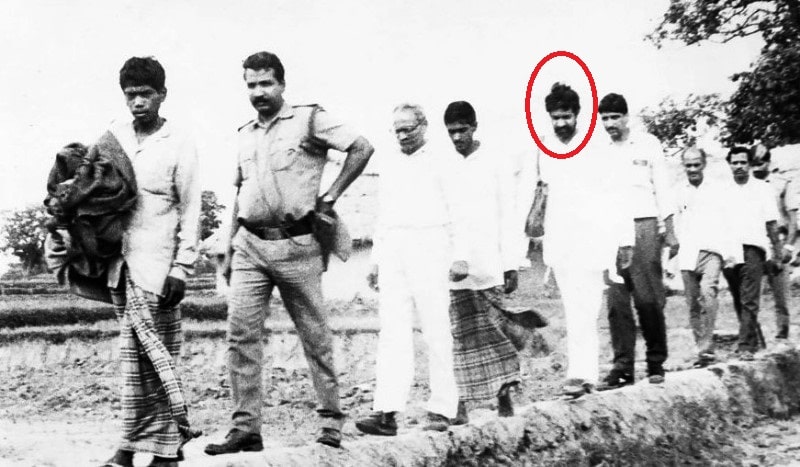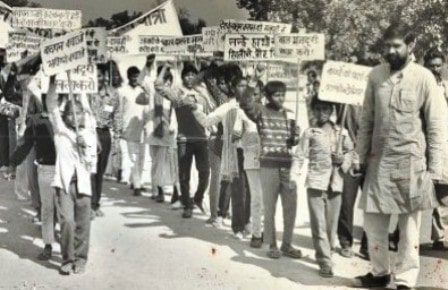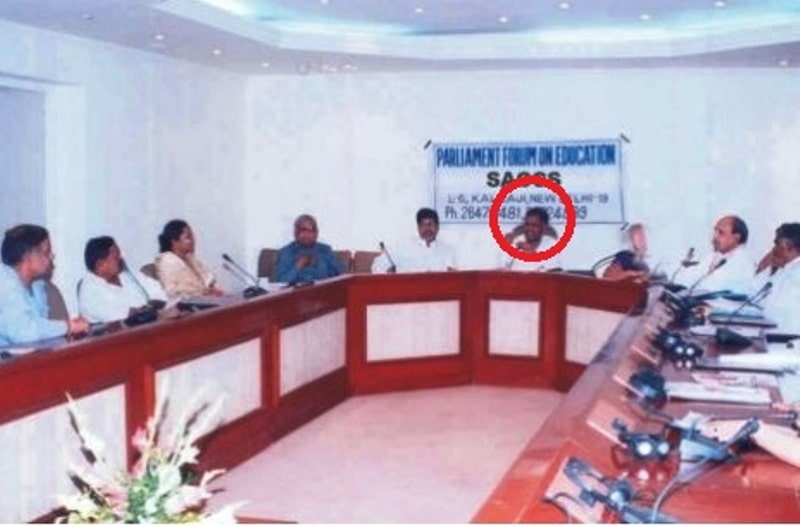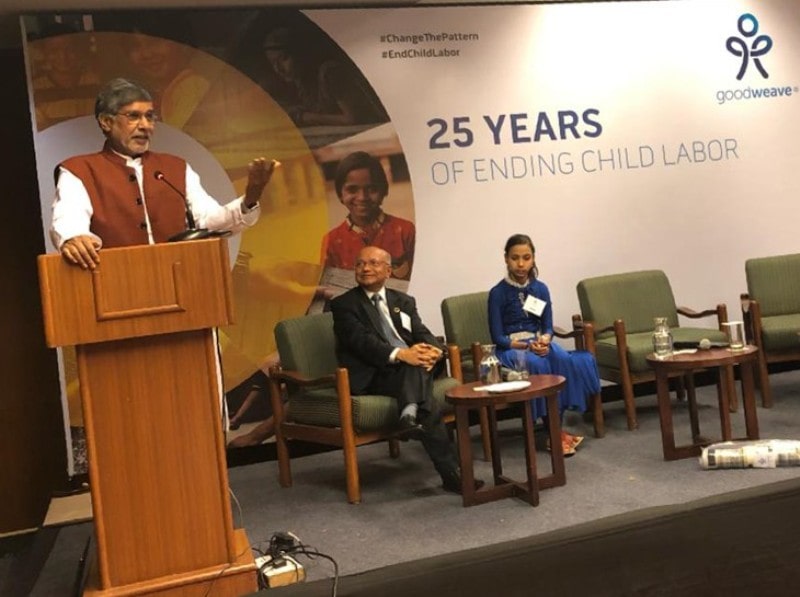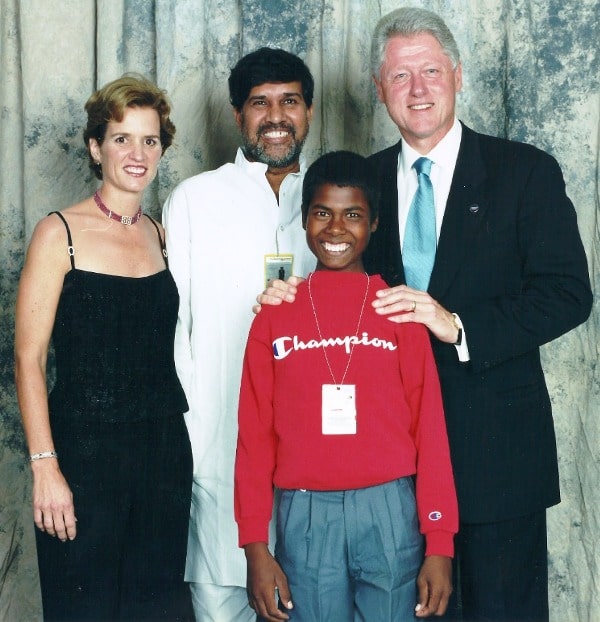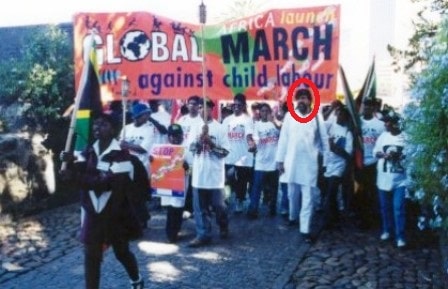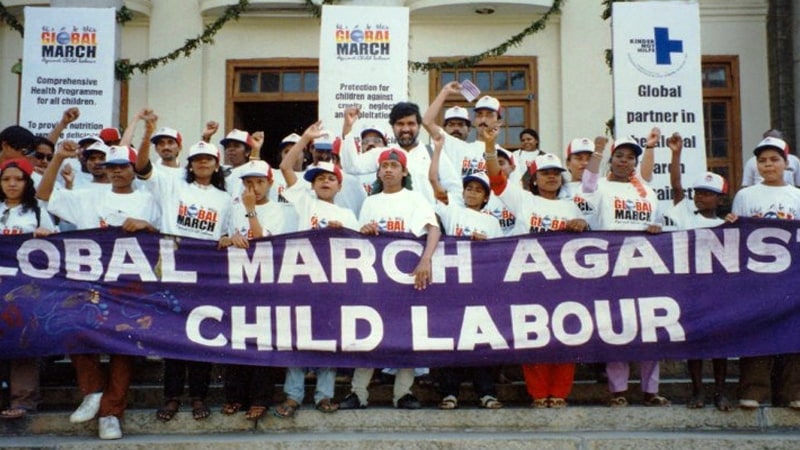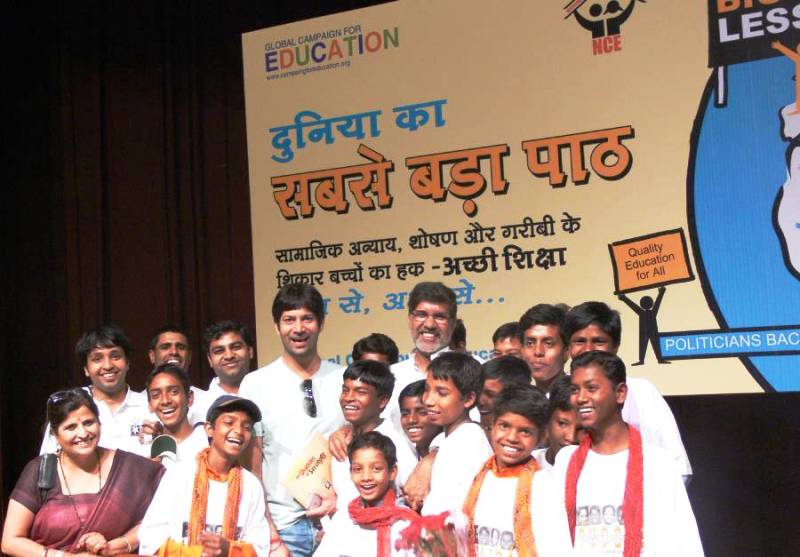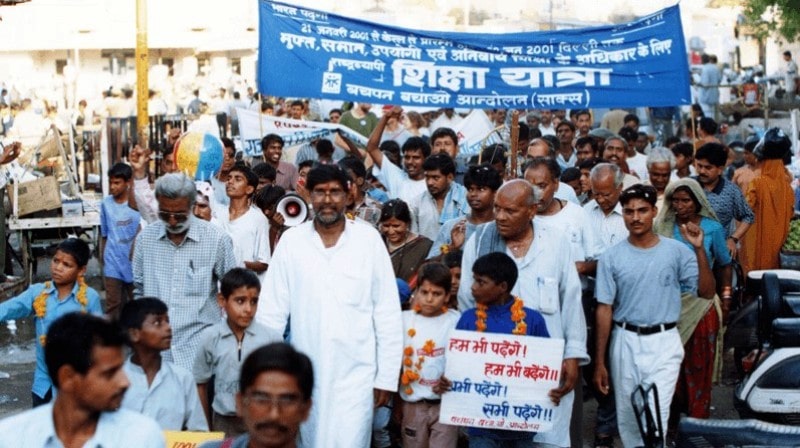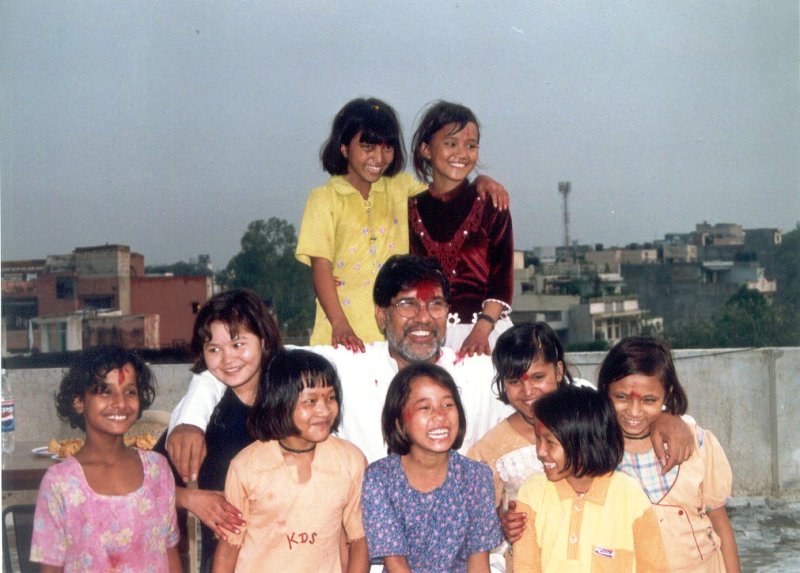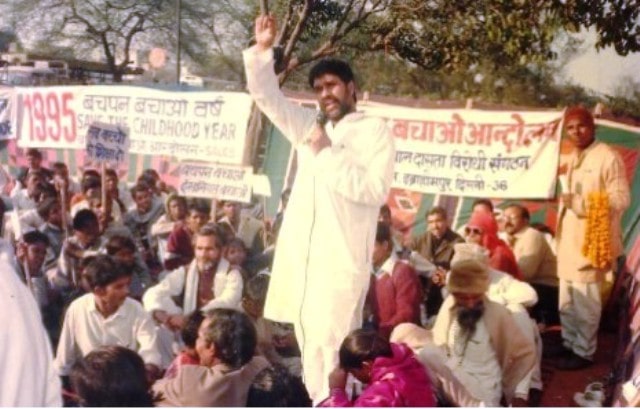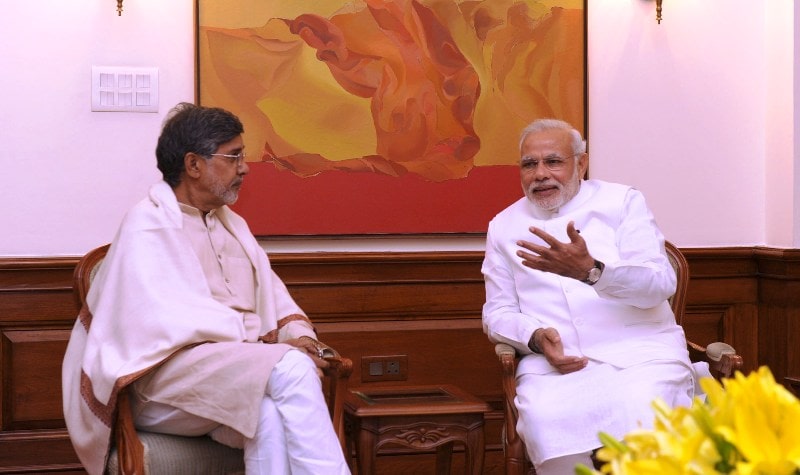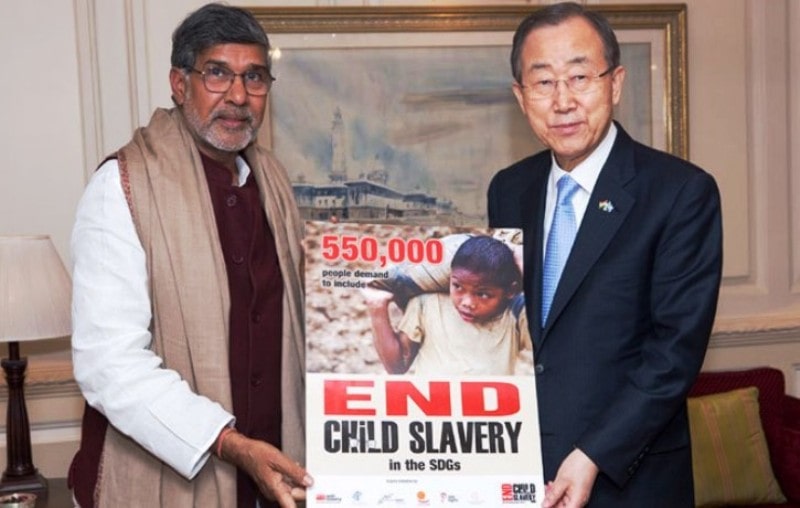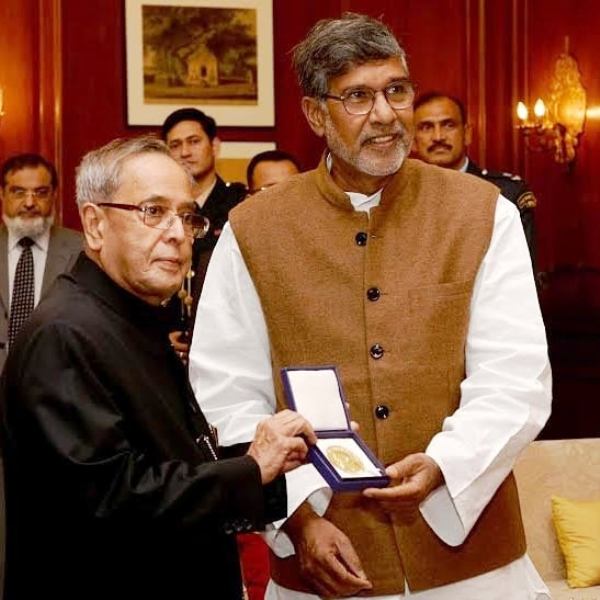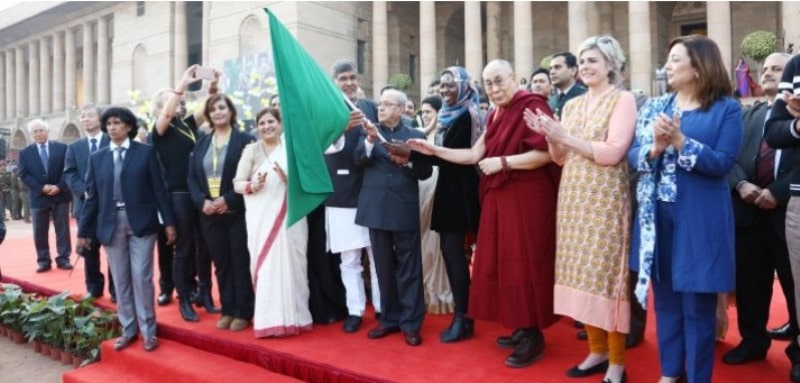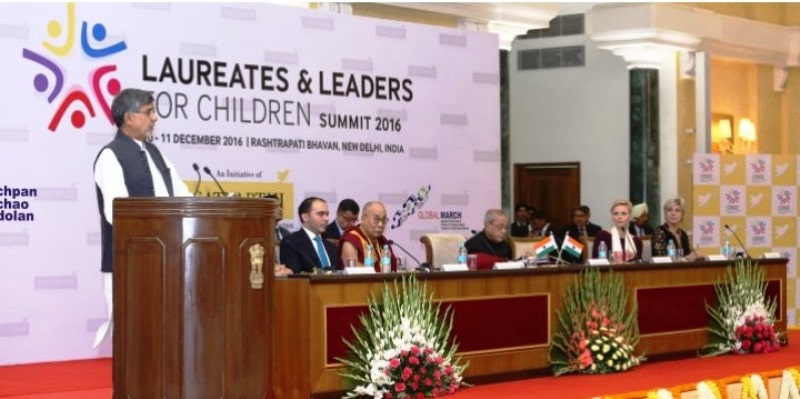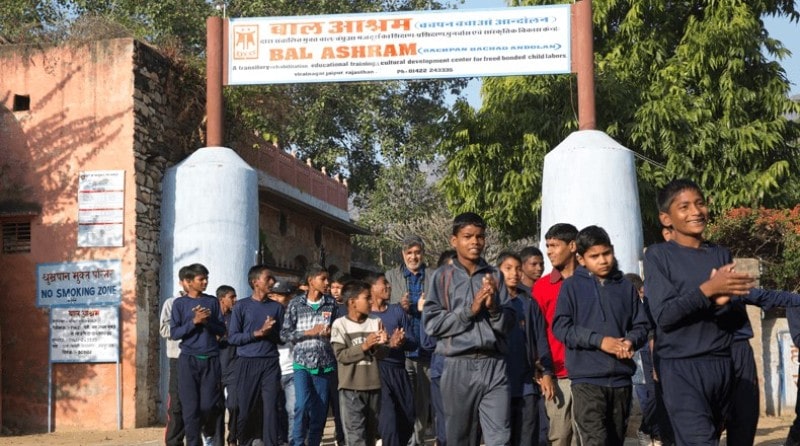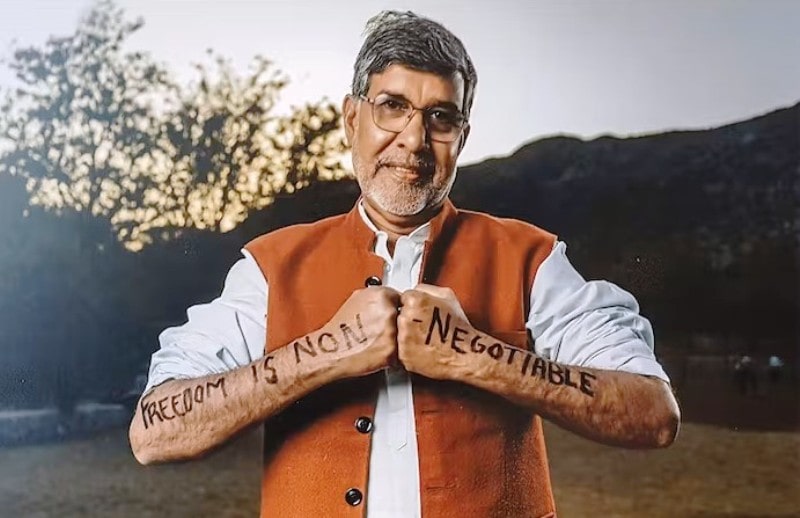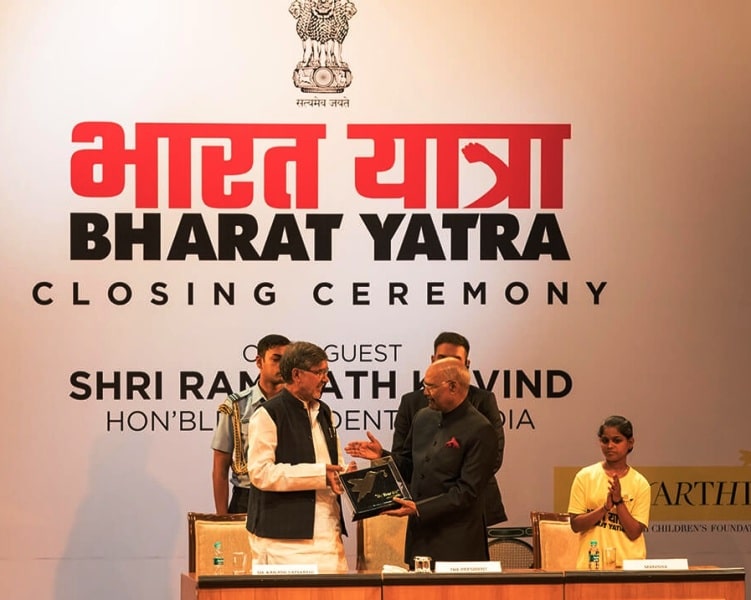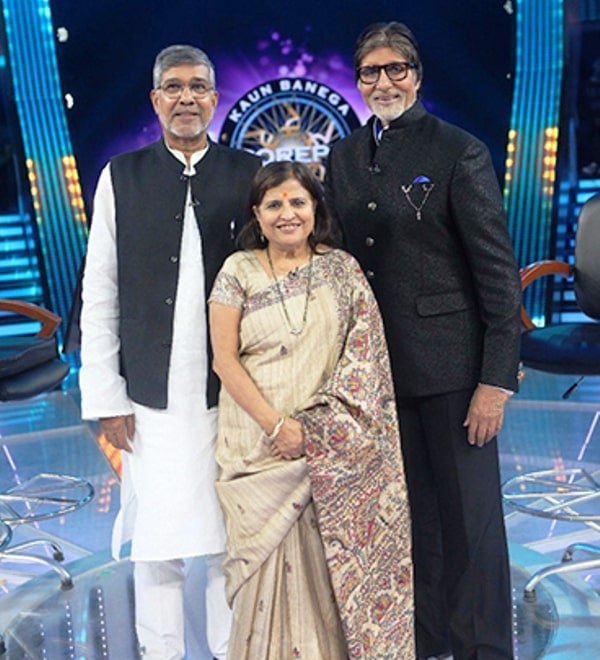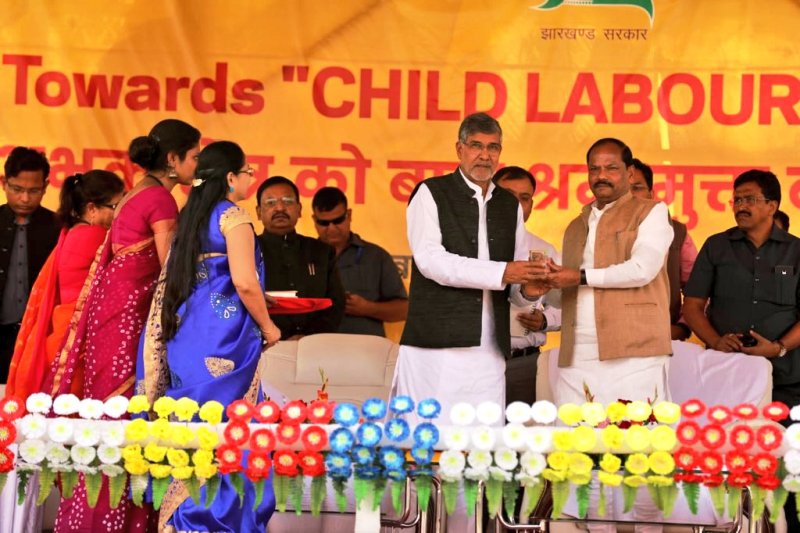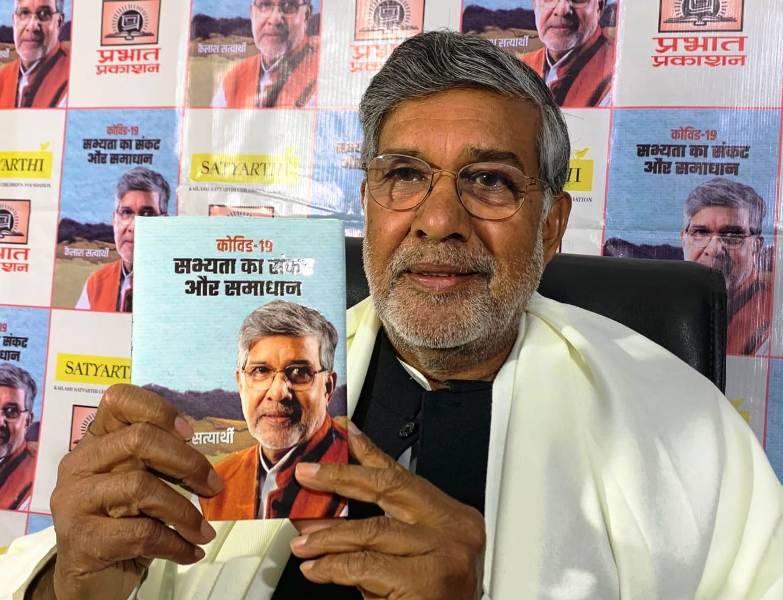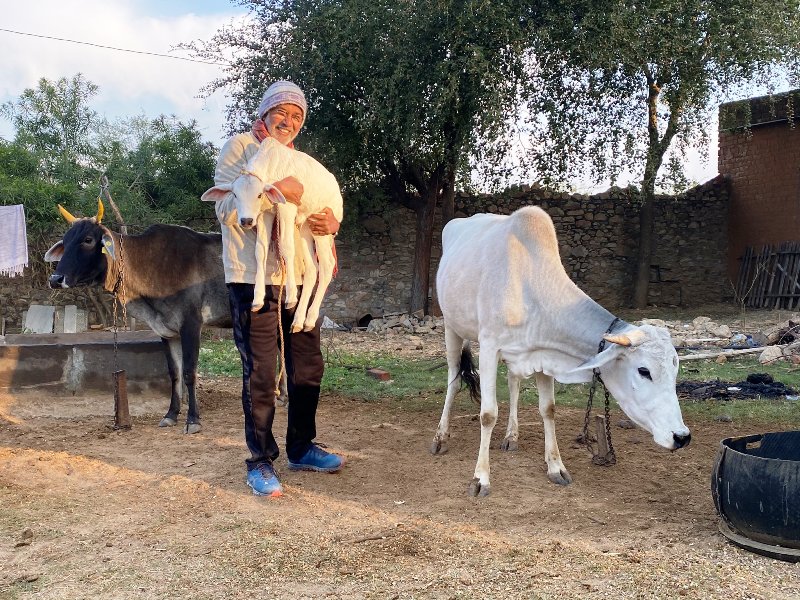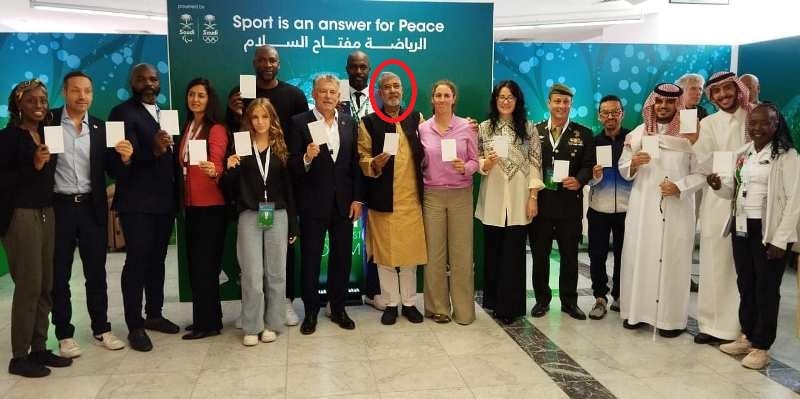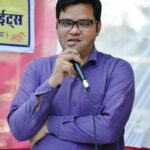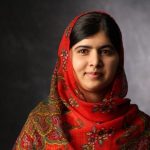Kailash Satyarthi Age, Wife, Family, Biography & More
| Bio/Wiki | |
|---|---|
| Birth Name | Kailash Sharma |
| Profession(s) | Engineer, Social Activist, Author |
| Famous for | Winning the Nobel Peace Prize in 2014 |
| Physical Stats & More | |
| Height (approx.) | in centimeters- 180 cm in meters- 1.80 m in feet & inches- 5’ 11” |
| Eye Colour | Dark Brown |
| Hair Colour | Salt and Pepper |
| Career | |
| Awards, Honours, Achievements | • The Aachen Peace Prize by the Government of Germany (1994) • The Trumpeter Award by the National Consumers League (1995) • Robert F. Kennedy Human Rights Award by the RFK Human Rights Foundation (1995) • Golden Flag Award (Netherlands) (1998) • De Gouden Wimpel Award (Netherlands) (1998) • La Hospitalet Award (Spain) (1999) • Friedrich Ebert Stiftung Award (Germany) (1999) 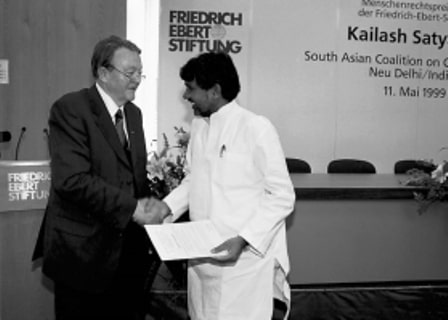 • Wallenberg Medal by the University of Michigan (2002) • Freedom Award (USA) (2006) • Included in the US State Department’s list of Heroes Acting to End Modern Day Slavery (2007) • Gold Medal by the Italian Senate (2007) • Alfonso Comin International Award by the Alfonso Comín Foundation (Spain) (2008) • Defenders of Democracy Award by the Parliamentarians for Global Action (PGA) (2009) 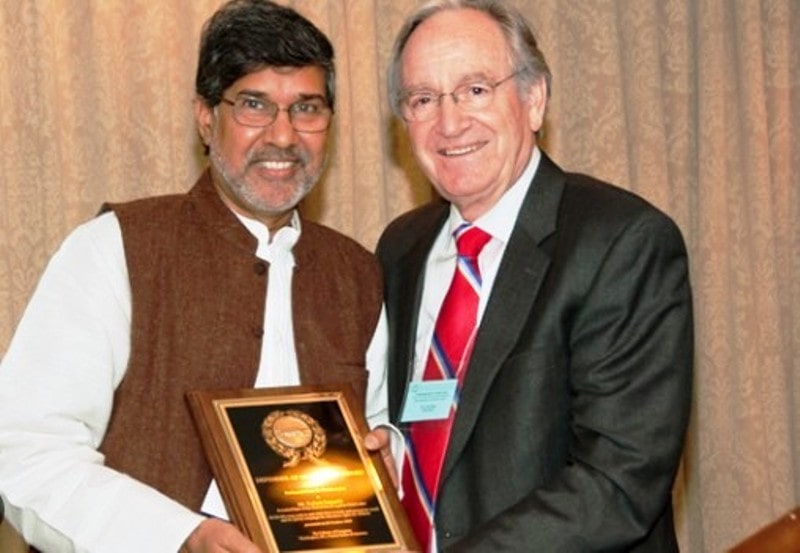 • Nobel Peace Prize for focusing attention on the grave exploitation of children for financial gain (2014) 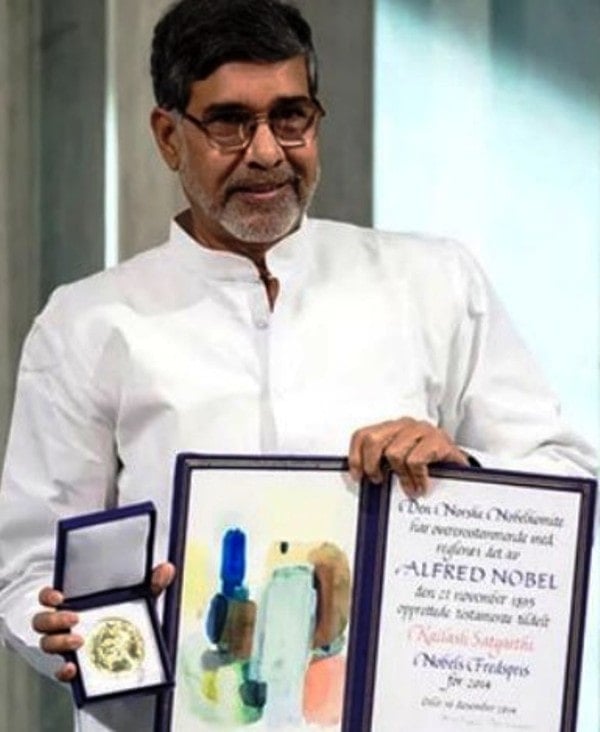 • Honorary Doctor of Philosophy Degree by Alliance University (2014) • Honoris Causa in Science by Amity University, Gurgaon (2015) • Humanitarian of the Year Award by the Harvard University (2015) 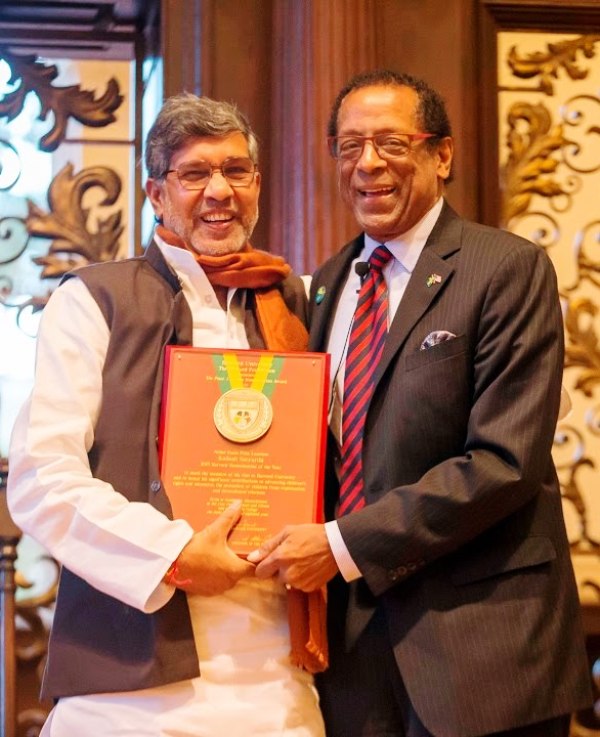 • Member-Fellow of the Australian Institute of Management (2016) • Doctor of Humane Letters by the Lynchburg College (USA) (2016) 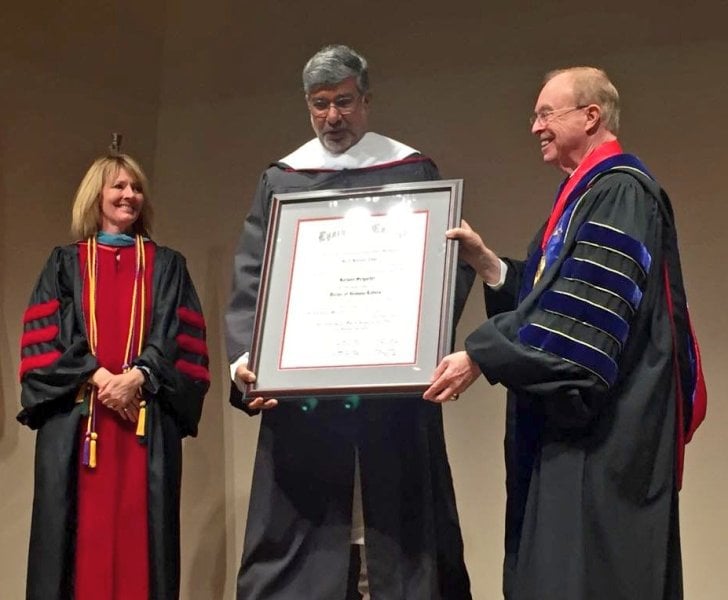 • Doctor of Law (LLD) by the West Bengal University of Juridical Sciences (2016) • Doctor of Science (Honoris Causa) by the Panjab University (2016) 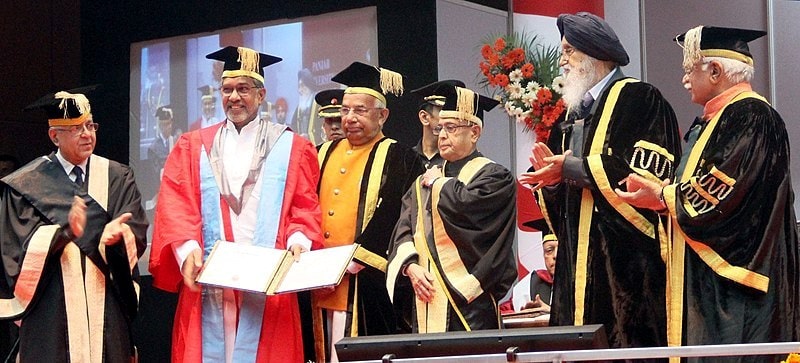 • P.C. Chandra Puraskaar for his global crusade against child slavery and exploitative child labour (2017) 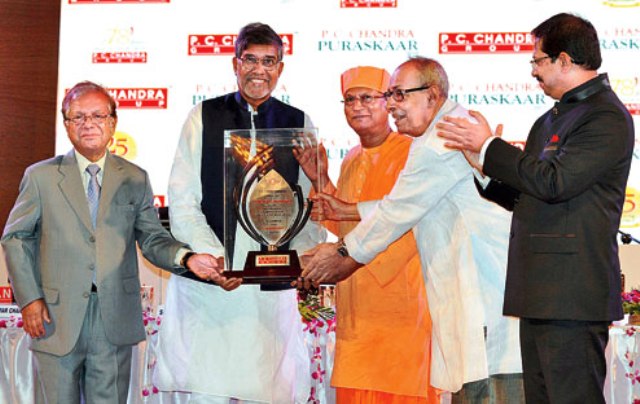 • Guinness World Record for Largest Child Safeguarding Lesson (2017) 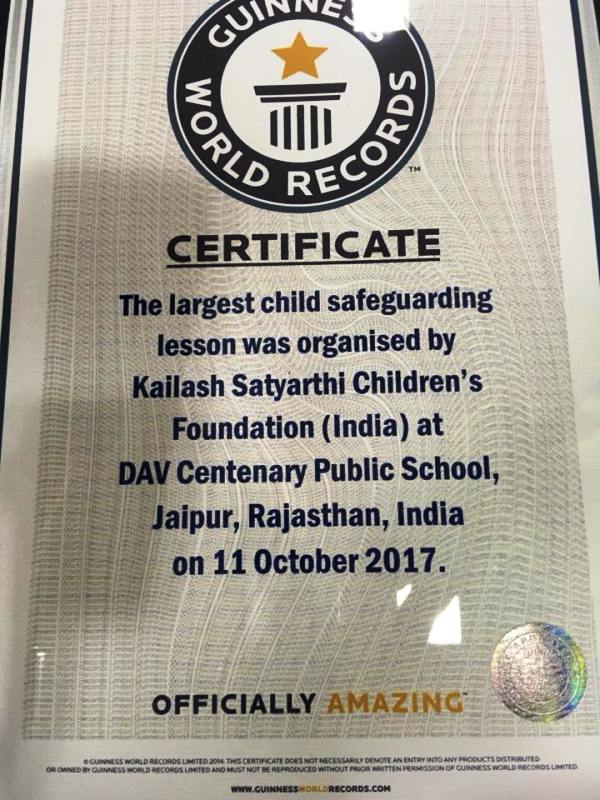 • Doctor Honoris Causa by the EL Rector Magnífico de la Universidad Pablo de Olavide (Spain) (2017) • Doctor Honoris Causa in Science by Amity University (2018) • The Santokbaa Humanitarian Award by Shree Ramkrishna Knowledge Foundation (SRKKF) (2018) • Lifetime Achievement Award by the Wockhardt Foundation Limited (2019) 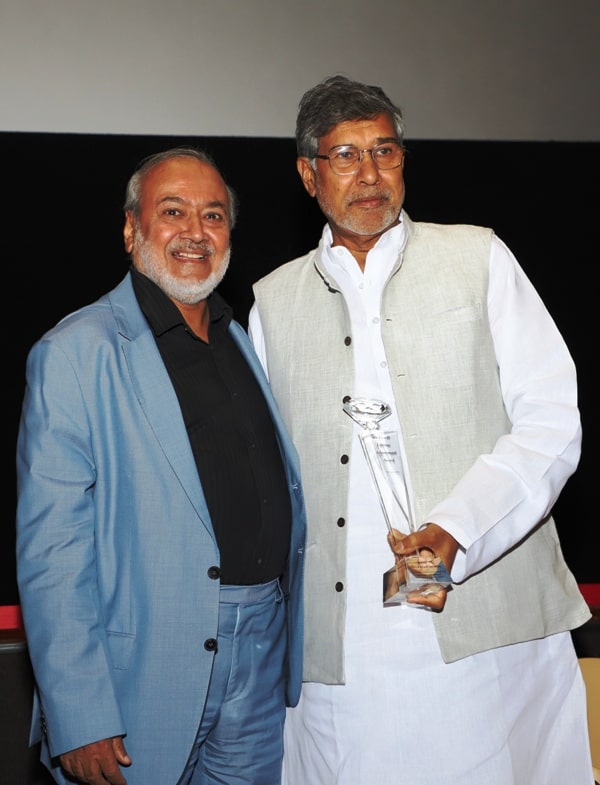 • The Mother Teresa Memorial Award for Social Justice (2019) • Doctor Honoris Causa by the Universidad Internacional de La Rioja (2019) 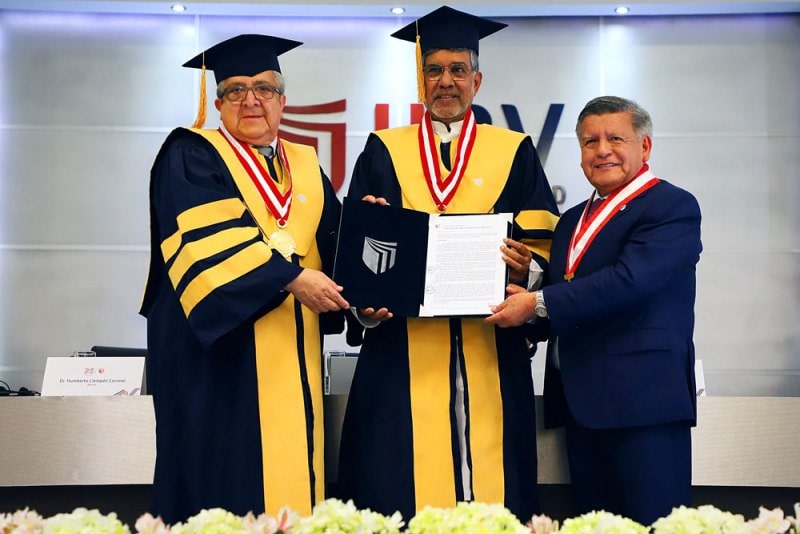 • Dr. Bhai Mohan Singh trophy (2020) 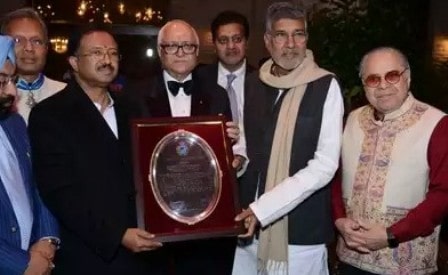 • Rotary Award of Honor by Rotary International (2022) 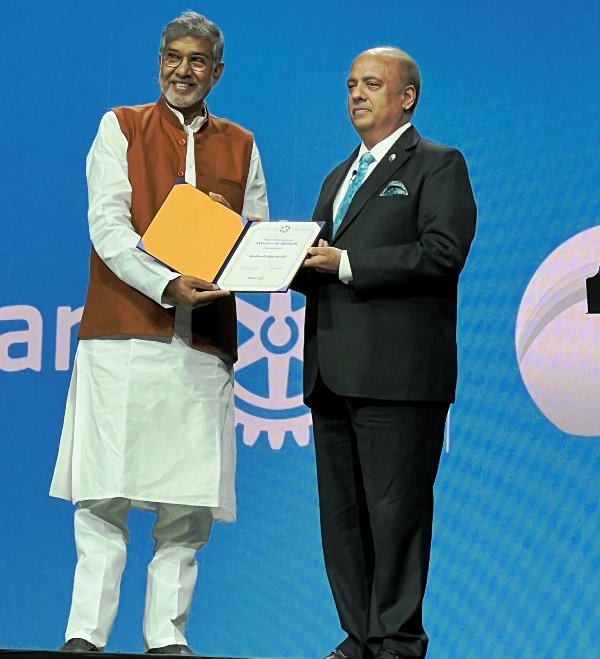 |
| Personal Life | |
| Date of Birth | 11 January 1954 (Monday) |
| Age (as of 2025) | 71 Years |
| Birthplace | Vidisha, Madhya Pradesh, India |
| Zodiac sign | Capricorn |
| Signature | 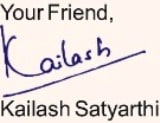 |
| Nationality | Indian |
| Hometown | New Delhi |
| School | Government Boys Higher Secondary School, Vidisha, Madhya Pradesh |
| College/University | Samrat Ashok Technological Institute (SATI), affiliated with Bhopal University (now known as Barkatullah University), Vidhisha |
| Educational Qualification(s) | • BTech in Electrical Engineering at SATI • Post-graduate diploma in Engineering • Diploma (Kovid) in Sanskrit at the Bharatiya Vidya Bhavan [1]The Guardian |
| Religion/Religious Views | Hinduism Note: According to Kailash, even though he is a Hindu, he does not visit temple frequently. He worships kids as he believes them to be the face of the God. He, in an interview, said, "I am not a religious person. I’ve not gone to a temple or mosque in the last 40 years. I don’t worship in temples because i worship children — by giving them freedom and childhood. They are the true faces of God and that is my strength." [2]The Times of India |
| Caste | Brahmin [3]Kailash Satyarthi Children's Foundation |
| Food Habit | Vegetarian [4]Kailash Satyarthi Children's Foundation |
| Controversy | Allegations of Financial Mismanagement In 1997, several trustees from the Mukti Pratishthan Trust (MPT), a charitable organization, submitted a legal complaint in a Delhi court against Kailash Satyarthi and Sumedha Kailash, accusing them of engaging in dishonest activities during their tenure within the trust. The complaint also alleged that the couple had redirected charitable funds towards personal endeavours, including international travel and the acquisition of high-value items. [5]The New Indian Express In response, Kailash and Sumedha initiated legal proceedings to refute the accusations and requested the court to dismiss the case. They further claimed that the MPT had orchestrated false charges on the orders of their mentor, Swami Agnivesh, a prominent political figure and leader of the Arya Samaj, for his own advantage. In 2015, the court received information that the trust had misplaced the financial records required to substantiate their claims. [6]India Today |
| Relationships & More | |
| Marital Status | Married |
| Affairs/Girlfriends | Sumedha Kailash (social activist)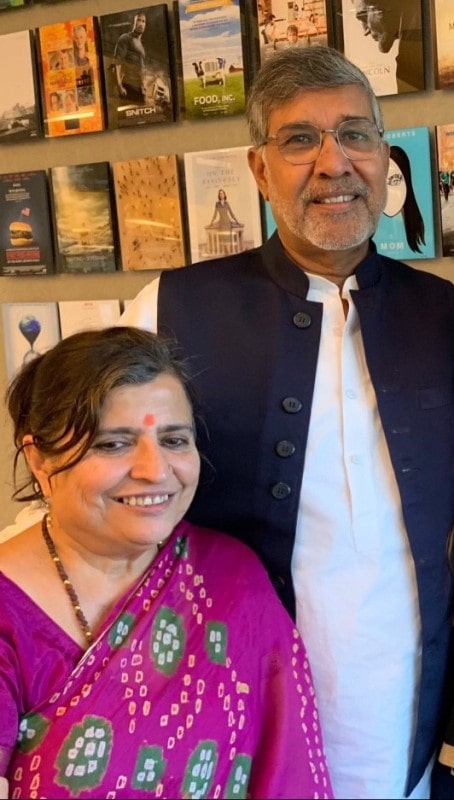 Note: Kailash and Sumedha dated for nearly a year after meeting in Delhi, where she worked as a co-editor for an Arya Samaj magazine. Despite objections from Sumedha's family due to Kailash's local reputation from social activism, they married after Sumedha insisted. [7]The Economic Times |
| Marriage Date | 8 October 1977 |
| Place of Marriage | New Delhi |
| Family | |
| Wife/Spouse | Sumedha Kailash (social activist)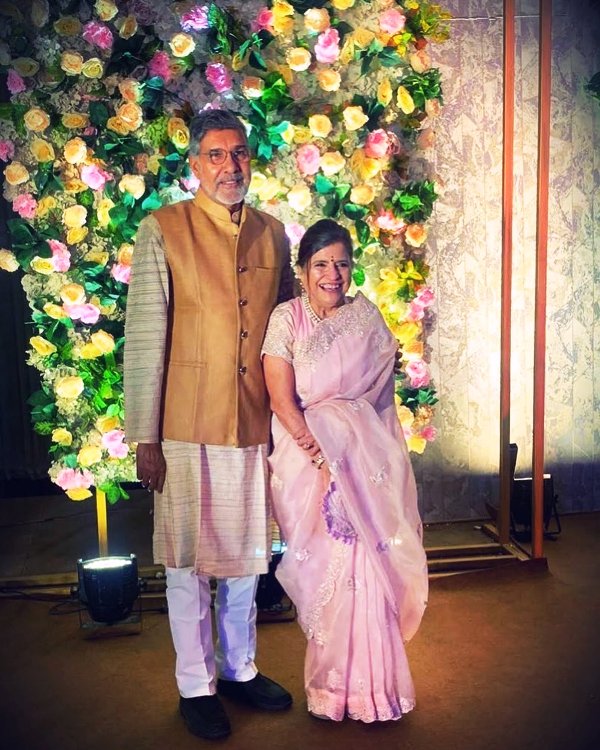 |
| Children | Son- Bhuwan Ribhu (social activist)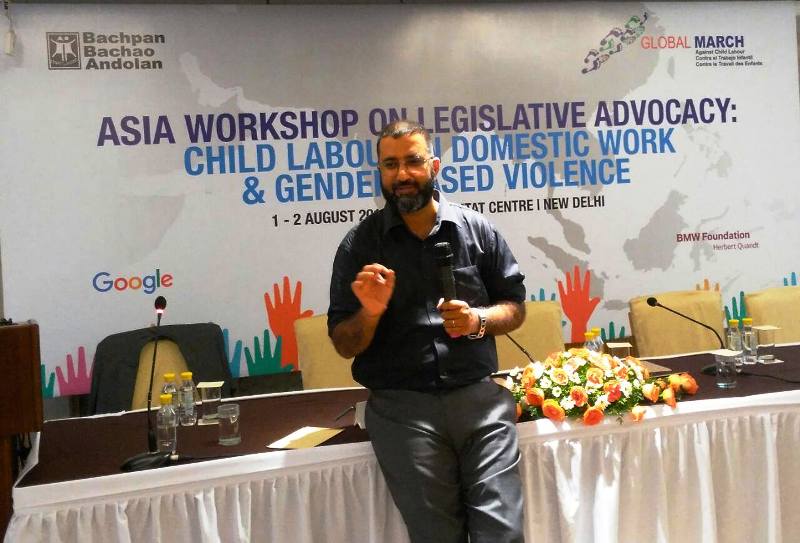 Daughter- Asmita Satyarthi (social activist) 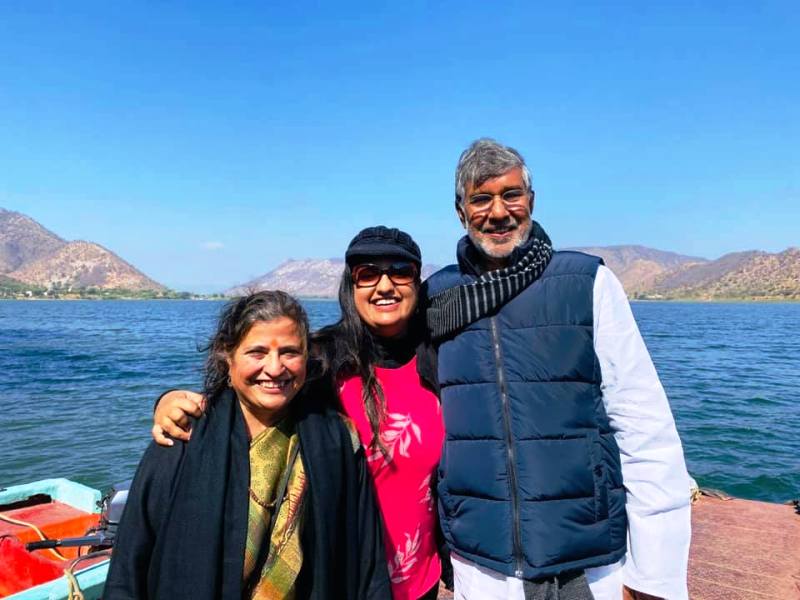 |
| Parents | Father- Ramprasad Sharma (retired Madhya Pradesh police constable) Mother- Chironji Sharma 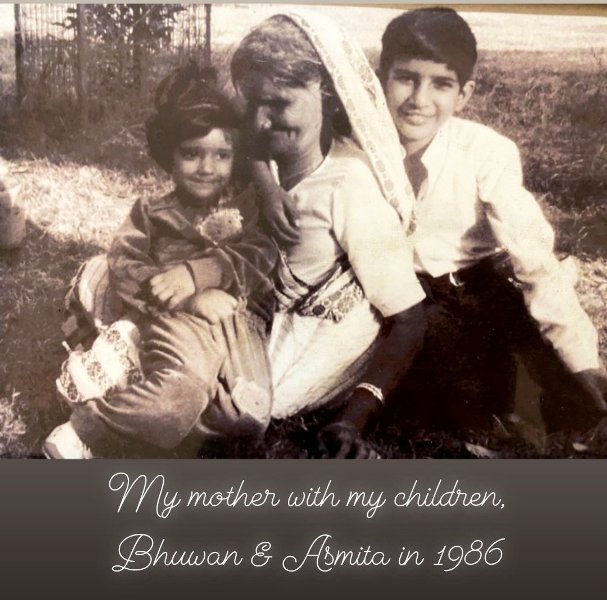 |
| Siblings | He has an elder brother. |
| Style Quotient | |
| Bike Collection | He owns a Royal Enfield.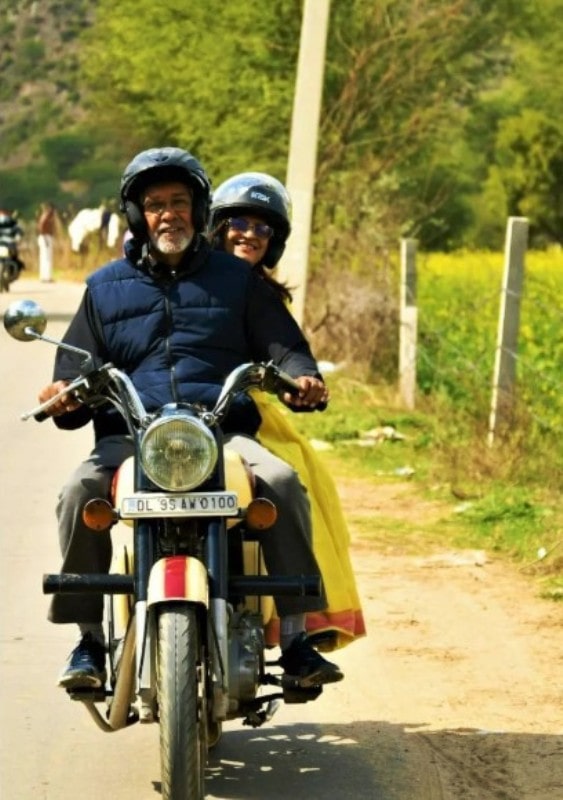 |
Some Lesser Known Facts About Kailash Satyarthi
- Kailash Satyarthi is an Indian electrical engineer, book writer, and social rights activist who is well-known for his children’s rights activism. In 2014, he shared the Nobel Peace Prize with Pakistani activist Malala Yousafzai. Satyarthi gained recognition for leading various organizations and initiatives, such as Bachpan Bachao Andolan, the Global March Against Child Labor, and the Global Campaign for Education. He was appointed as the United Nations Sustainable Development Goals (UNSDG) Advocate in 2021.
- He was born into a middle-class family in Madhya Pradesh.
- He started advocating for underprivileged kids when he was in class 5th.
- According to Satyarthi, he started questioning the difference between his and the underprivileged kids’ lives after he witnessed a child do cobbling after being forced by his father as the father did not have money to afford the child’s education.
- To help the poor kids get educated, Satyarthi started a campaign to collect old and used books. He was successful in collecting more than 2000 books, which he distributed among the poor kids with the help of the headmaster of his school.
- Soon, the idea of collecting and distributing old books gained popularity in Vidisha as a result of which it was taken into practice by many schools in the city. This eventually led to the formation of a “book bank” for the underprivileged kids to go and read books without any charge.
- When he was pursuing BTech in Madhya Pradesh, Kailash not only got involved in student politics but also began writing articles related to social activism for Jangyan, which is a Delhi-based magazine run by the Arya Samaj.
- As a college student, he organised numerous events aimed at creating the environment for the upper caste section of society to accept the Dalits as part of the society. However, he was often criticised, especially by the temple pujaris, for doing so.
- Kailash said that he faced a boycott from his family after hosting an event where he consumed meals prepared by the Dalits when he was in college. He also said that his boycott resulted from societal pressure on his parents, who were forced to choose between sending him for a ritual cleansing in the Ganga River or leaving their home. He, in an interview, said,
The priests were shocked and they asked my family members to disown me and shift me to a separate room in the backyard or face ostracisation from the community. I was instructed not to enter the house and was given separate utensils. It was further decided that my food would be sent to the small room itself. Who are these people to throw me out of the community? I do not want to be associated with a hypocrite community in the first place.”
- Angered by the decision enforced on his family by the high-caste elements of society, Kailash decided to denounce his surname Sharma and use Satyarti (seeker of the truth) instead. He, while giving an interview, said,
My ‘punishment’ was being decided – whether I would be expelled from my caste, or I would be sent to Haridwar for ‘purification’. This made me even more furious. It was decided that I would be given a separate room and I would be treated like an untouchable. I stayed there for many years in that room, and my mom used to cry while giving me food from a distance. I gathered strength with a lot of difficulty. I then decided that who are they to expel me? I set myself free from the shackles of caste and changed my surname.”
- Satyarthi worked as a college professor in Madhya Pradesh after obtaining a BTech degree but later left to pursue activism.
- He started advocating for the rights of the children in Vidisha and adopted non-violent methods of protesting against injustice against the poor kids as he was deeply influenced by the preachings of Mahatma Gandhi.
- Satyarthi came up with the theory of the ‘Triangular Paradigm’ during global policy discussions. The theory emphasises the links between child labour, illiteracy, and poverty.
- To safeguard children’s rights, Kailash, in 1980, founded Bachpan Bachao Andolan (BBA). It was among India’s earliest initiatives focused on shielding children from labour exploitation and human trafficking.
- Once he set up the BBA, he headed to Punjab, where he liberated numerous children labouring in mines and brick kilns.
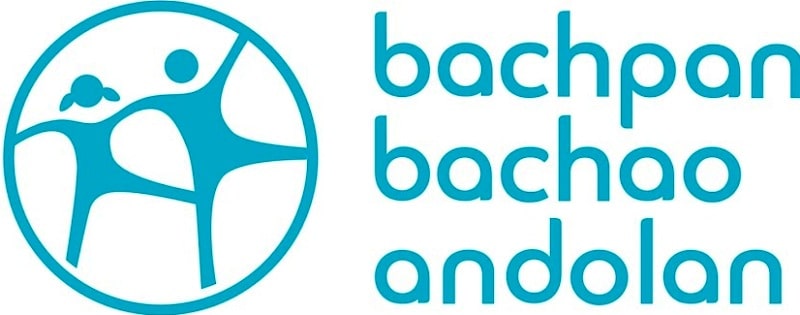
- Satyarthi faced numerous death threats due to his social activism. He was assaulted by a criminal organization in the early 1980s in Uttar Pradesh (UP), resulting in injuries, the loss of friends, and the destruction of his home.
- He founded Sangharsh Jari Rahega, a magazine dedicated to spreading awareness about social activism, in 1981.
- Later, he initiated the National Level Chaupal on Bonded Labour at Daltonganj, Palamu, Bihar.
- He initiated several campaigns to rehabilitate the people impacted during the 1984 anti-Sikh riots in India and also raised his voice in support of delivering speedy justice to the victims. As per reports, he allowed many Sikhs to live in his house during the riots to shield them from the mobsters.
- After that, he founded the Nagrik Ekta Manch through which he advocated for the victims. He also exhibited the photos of the victims, seeking justice for them, in exhibitions. He also visited the rehabilitation camps set up by the Indian government for the displaced Sikhs to inspect the condition of the camps. Despite a threat to his own life, he continuously spoke to give justice to the riot victims.
- In December 1985, he saved child labourers in Uttar Pradesh and successfully obtained Rs. 6,000 compensation for them from the Government of Uttar Pradesh.
- He had a crucial role in enacting the 1986 Child Labour (Prohibition and Regulation) Act.
- In 1989, he established the South Asian Coalition on Child Servitude (SACCS) in New Delhi as a regional arm of the BBA. It is dedicated to addressing child trafficking issues in South Asian nations.
- Reportedly, Satyarthi is the first person to have coined the term “social accountability.” He came up with the concept a long time before the term Corporate Social Responsibility (CSR) came into existence.
- In 1994, Satyarthi founded GoodWeave International (earlier known as Rugmark), a group of non-profit organizations dedicated to eradicating child labour in the rug industry. They offer a special logo to companies demonstrating that their products are child-labour-free. Rugmark has launched multiple campaigns to raise consumer awareness in the US and the European Union regarding child labour in everyday products.
- In 1996, he conceived the idea for the Global March Against Child Labor in New Delhi.
- The National Bal Sansad and Bal Adalat, which he organised for the first time in New Delhi in 1997, was attended by more than 20,000 people.
- On 17 January 1998, he led a global march spanning 80,000 kilometres across 103 nations, engaging over 7.2 million participants.
- On 1 June 1998, the march concluded at the International Labour Office (ILO) in Geneva, resulting in the universal adoption of the ILO Convention 182 addressing the gravest child labour practices.
- Satyarthi began a global initiative named Global Campaign for Education (GCE) in 1999. The initiative unites multiple child rights and education-focused NGOs, including ActionAid, Oxfam International, and Education International. In 2023, it operated in over 80 countries.
- In 2001, he organised the Shiksha Yatra, a march with the goal of promoting awareness regarding the fundamental right to education for children. This initiative played a pivotal role in making the path for the enactment of the 86th Amendment Act, which made the Right to Education a fundamental right.
- In 2004, Kailash established the Kailash Satyarthi Children’s Foundation (KSCF) in India. KSCF has initiated programs like Bal Mitra Gram (BMG) to foster a nurturing environment for rural children and Bal Mitra Mandal (BMM) to establish child-friendly conditions in India’s slums.
- In the same year, while rescuing trafficked Nepalese underage girls from a circus in Uttar Pradesh, Satyarthi was assaulted by hired thugs working for the circus owner. He was beaten severely with various weapons, resulting in serious injuries. However, despite his injuries, Satyarthi successfully compelled the Uttar Pradesh government to take action against the circus owner through an indefinite strike.
- In 2005, he was featured in the PBS series “The New Heroes,” hosted by actor Robert Redford.
- After that, under KSCF, Satyarthi established organisations such as Satayrthi Global Policy Institute For Children (SGPIC) and Under Tactical Response Against Child Cyber Exploitation (TRACE). Through such organisations, Kailash assisted the Maharashtra administration in tackling child abuse and providing quick relief to the affected kids.
- KSCF has its base in the United States of America (USA) as well.
- In 2007, the South Asian March Against Child Trafficking for Forced Labour was founded; it was created due to the march.
- The global movement resulted in the South Asian Association for Regional Cooperation (SAARC) incorporating child trafficking into its official agenda.
- In 2007, BBA created “Ropes In Their Hands,” a short documentary recounting Kailash’s 2004 mission to save young Nepalese girls from a circus in Uttar Pradesh. The film was later showcased at the New York International Independent Film and Video Festival (NYIIFVF) in April 2007.
- In collaboration with Kailash Satyarthi’s Bachpan Bachao Andolan (BBA), the Supreme Court of India started the All India Legal Aid Cell on Child Rights, under the National Legal Services Authority in India (NALSA), in 2009.
- In the FIFA World Cup in 2010, Kailash’s 1-goal campaign, aimed at seeking the assistance of at least a million people all around the world to speak for children’s rights, was endorsed by Rania Al Abdullah, the Queen of Jordan.
- In 2011, Kailash Satyarthi’s PIL in the Indian Supreme Court led the court to define ‘child trafficking,’ resulting in the adoption of the Palermo Protocol, an internationally consented agreement regarding children’s rights. Later, the Indian government amended IPC Sections 370 and 370A to strengthen anti-human trafficking measures.
- On 8 December 2011, BBA published Missing Children of India, which is a comprehensive analysis of the statistics regarding the children that went missing in India and were not found.
- In 2012, he and the German government called for the International Labour Organization (ILO) to establish regulations to eradicate child labour and exploitation, resulting in the creation of the International Programme on the Elimination of Child Labour (IPEC).
- He organised the End Child Slavery Week Campaign in 2014. The campaign and his efforts were applauded by many global personalities.
- Kailash Satyarthi submitted a petition containing 5,50,000 signatures to UN Secretary-General Ban Ki-moon, urging him to include reducing child slavery within the mandate of the United Nations Sustainable Development Goals in the same year.
- Kailash dedicated his Nobel Peace Prize medal to India in 2015 by presenting the medal to the then President of India Pranab Mukherjee in a ceremony. The medal was later put on display in New Delhi in the President’s House Museum.
- In 2016, the KSCF initiated the 100 million campaign with the ambition of recruiting 100 million individuals worldwide to support marginalized children. This initiative was carried out in collaboration with various international organizations, such as the Global Students Forum (GSF), the All-Africa Students Union (AASU), the European Students’ Union (ESU), the Organizing Bureau of European School Student Unions (OBESSU), the Commonwealth Students Association (CSA), Education International, and the Inter-Parliamentary Union (IPU).
- In the same year, he initiated “Laureates and Leaders for Children,” a project aimed at fostering partnerships between prominent global figures, including Nobel laureates and world leaders, to provide assistance to disadvantaged children. The inauguration event was attended by many well-known personalities such as Dalai Lama.
- The BBA, under Satyarthi’s leadership, has launched several campaigns advocating for children’s rights and has worked with popular actors.
- BBA has not only rescued kids in distress but also worked on their rehabilitation aimed at bringing them back to society. The organisation administers the Delhi-based Mukti Ashram and the Rajasthan-based Bal Ashram. The Mukti Ashram gives shelter to kids who are saved in Delhi and its adjoining areas; the rescued kids get medical treatment, food, and clothes till someone from their immediate family comes to take them. Those kids who have no family to come and get them are provided with education at the Bal Ashram. They stay there until they are capable enough to look after themselves.
- BBA has also collaborated with the Indian government and multiple law enforcement agencies to rescue over 1,26,000 children globally as of 2023.
- Under his leadership, the Kailash Satyarthi Children’s Foundation (KSCF) initiated the Bharat Yatra campaign, commencing from Kanyakumari, on 11 September 2017. This initiative aimed to raise awareness concerning the rights of children and strategies to safeguard them from exploitation. The campaign covered a distance of over 12,000 kilometres, encompassing 22 states and Union Territories, and gathered the support of more than 5,000 non-governmental organizations. 1.2 million individuals took part in the 35-day march, which ultimately contributed to the enactment of the 2018 Criminal Law Amendment Act. This legislation established severe penalties for child rape. Moreover, the Yatra played a pivotal role in the passage of the Anti-Human Trafficking Bill during the 16th Lok Sabha.
- In February 2017, burglars entered the home of Kailash Satyarthi in Greater Kailash, New Delhi, and stole his Nobel Peace Prize medal along with its citation, both of which he had been awarded in 2014. However, the Delhi Police successfully retrieved the stolen items from the robbers.
- In September 2017, India Times acknowledged Kailash Satyarthi as one of the 11 Human Rights Activists committed to the noble endeavour of safeguarding the principle of a dignified existence for fellow individuals.
- In the same year, Kailash received an invitation to address the 4th Global Conference on Child Labour held in Buenos Aires, Argentina.
- Kailash and Sumedha were invited to take part in Kaun Banega Crorepati (KBC) in 2017. The money that the duo won in the show was committed to the cause of children’s rights.
- On Kailash Satyarthi’s struggles as an activist, a documentary film titled The Price of Free was made in 2018; the film went on to win the Sundance Grand Jury Prize at the Sundance Film Festival US.
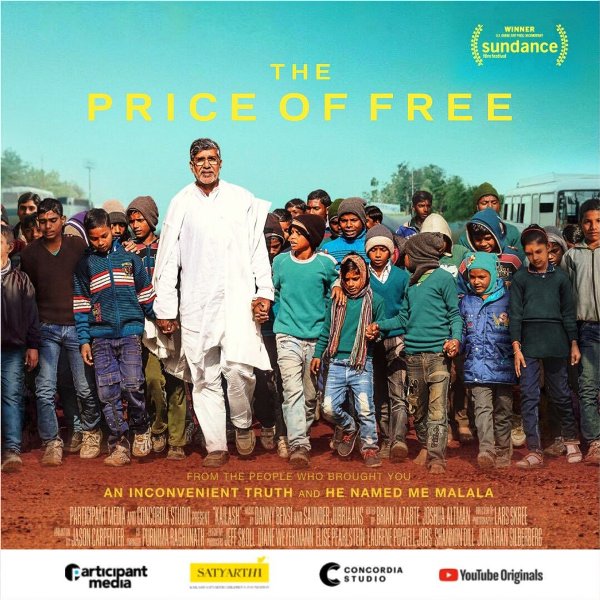
- The KSCF signed an agreement with the Government of Jharkhand in October 2018. According to the agreement, both pledged to shield the kids who were being exploited in the mica mines of Jharkhand.
- He has penned several books such as Will for Children (2017), Because Words Matter (2017), The Light of the Same Sun (2017), Badlav Ke Bol (2018), Every Child Matters (2018), and Covid-19 : Sabhyata Ka Sankat Aur Samadhan (2021), and The Book of Compassion (2024).
- Kailash is a passionate writer who began writing in his early years. He has written numerous poems in a collection titled “Chalo Hawaon Ka Rukh Moden.” In 1998, he composed the theme song “Hum Nikal Pade Hain” for the Global March Against Child Labour.
- Kailash enjoys photography and making different types of dishes. According to him, Sumedha, his wife, enjoys his homemade stuffed tomato dishes and parathas. While giving an interview, he said,
There is one dish that my wife really appreciates – stuffed tomatoes. I had made this dish for Sumedha Ji before we got married; I think it helped in influencing her decision to get married to me.”
- Although Kailash Satyarthi enjoys biking, doctors have advised against it due to spinal cord injuries resulting from attacks by mafias during his social activism.
- Kailash has not only done activism in India but has also done the same in Bangladesh, Pakistan, and Sri Lanka. While sharing an incident while he was leading a demonstration against child abuse in Pakistan, Satyarthi revealed that he almost got arrested by the military. He talked about it, in an interview, and said,
I helped start Pakistan’s anti-child labour movement, when Pakistan’s army wanted to kill me outside Lahore in 1987. I was addressing brick-kiln workers there when soldiers came and put a dozen guns on my head. I smiled and said, please kill me but only after 10-15 minutes when I’ve finished talking to these people.”
- In an interview, Asmita, Kailash’s daughter, said that after her father resigned from his position as a lecturer in an engineering college in Madhya Pradesh to pursue social activism, her mother’s parents decided to disown Sumedha. She said,
When he decided to quit his teaching job at a college in Vidisha, my mother’s family was very unhappy. They were not too happy anyway, because they had eloped and married. His decision to quit gave my maternal parents another reason to disown my mother. But my mother supported him through very difficult times.”
- As a social activist, he has served in many NGOs such as the Center for Victims of Torture (CVT), the International Labor Rights Forum (ILRF), and the International Cocoa Organization (ICCO) as their board member.
- Kailash Satyarthi has delivered speeches to elected representatives in countries such as the United States of America, Germany, and the United Kingdom on various occasions.
- He likes animals a lot and has numerous sheds for sheltering cows in his ashrams across India.
- Kailash Stayarthi became an advocate of the United Nations Sustainable Development Goals (UNSDG) in 2021. He was made the advocate in 2021 by the United Nations General Secretary Antonio Guterres. Kailash, in an interview, talked about his appointment and said,
It is a recognition of the seriousness of the crisis faced by children today in this world. We have witnessed the first increase in child labour in two decades, even before the pandemic hit a warning sign that we are facing the threat of failing on the promises of Agenda 2030. Peace, justice and sustainability will only be achieved when every child is free, safe, healthy and educated. Every child matters.”
- In 2023, Kailash Satyarthi was invited to attend the Peace and Sport Middle East Forum in Riyadh, where he talked about children’s rights.
References/Sources:

